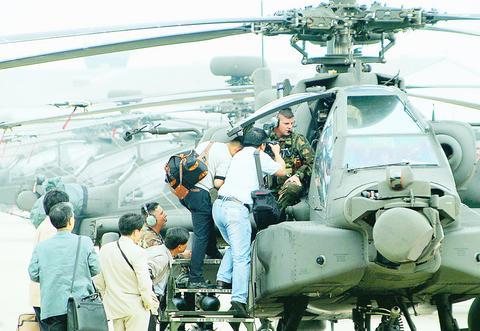South Korea's top official in charge of relations with North Korea said yesterday that intensifying pressure on the communist state would force it to accept a US offer for multilateral talks on halting its suspected nuclear weapons programs.
North Korea has insisted on one-one-one meetings with the US, hoping to win security guarantees and massive economic aid in exchange for giving up its nuclear programs. Washington considers Pyongyang's nuclear ambitions a regional threat and says any talks on the crisis should include China, Japan, South Korea and possibly Russia.

PHOTO: AP
"Various forms of pressure on North Korea -- I wouldn't call them sanctions but rather diplomatic pressure -- would get the North to change its mind," said South Korean Unification Minister Jeong Se-hyun in an interview with Seoul's CBS radio.
Jeong said talks including Japan and South Korea are "the North's only option" and that North Korea "is expected to change its attitude in one or two months."
In recent weeks, the US and its regional allies, most notably Japan and Australia, have vowed to crack down on the North Korean trade in illicit drugs, weapons and counterfeit money.
Japanese authorities have beefed up inspections of North Korean ships long suspected of smuggling missile parts and narcotics between the two countries. In the past few days, they have detained one cargo ship and blocked another from docking for safety violations.
In April, Australian authorities raided a North Korean-owned ship and charged its crew with aiding and abetting the trafficking of heroin.
Also yesterday, South Korea's mass-circulation JoongAng Ilbo newspaper, citing unnamed intelligence sources, said Iranian cargo planes traveled to North Korea six times since April, flying through airspace over China and Central Asia and carrying what appeared to be missile parts from Pyongyang.
The news comes seven months after a shipment of North Korean Scud missiles bound for Yemen was briefly stopped in the Arabian Sea as a US warning against North Korea's role in missile proliferation. JoongAng said North Korea now appears to be using aircraft instead of ships to export its missiles, believed to be a key source of hard currency for Pyongyang.
Seoul's Defense Ministry would not confirm the report.
Jeong's remarks echoed those of a senior Japanese official a day earlier. On Sunday, Japanese Deputy Cabinet Secretary Shinzo Abe said that continued pressure could result in a "dramatic turn" in North Korea's policies.

A fire caused by a burst gas pipe yesterday spread to several homes and sent a fireball soaring into the sky outside Malaysia’s largest city, injuring more than 100 people. The towering inferno near a gas station in Putra Heights outside Kuala Lumpur was visible for kilometers and lasted for several hours. It happened during a public holiday as Muslims, who are the majority in Malaysia, celebrate the second day of Eid al-Fitr. National oil company Petronas said the fire started at one of its gas pipelines at 8:10am and the affected pipeline was later isolated. Disaster management officials said shutting the

US Vice President J.D. Vance on Friday accused Denmark of not having done enough to protect Greenland, when he visited the strategically placed and resource-rich Danish territory coveted by US President Donald Trump. Vance made his comment during a trip to the Pituffik Space Base in northwestern Greenland, a visit viewed by Copenhagen and Nuuk as a provocation. “Our message to Denmark is very simple: You have not done a good job by the people of Greenland,” Vance told a news conference. “You have under-invested in the people of Greenland, and you have under-invested in the security architecture of this

Japan unveiled a plan on Thursday to evacuate around 120,000 residents and tourists from its southern islets near Taiwan within six days in the event of an “emergency”. The plan was put together as “the security situation surrounding our nation grows severe” and with an “emergency” in mind, the government’s crisis management office said. Exactly what that emergency might be was left unspecified in the plan but it envisages the evacuation of around 120,000 people in five Japanese islets close to Taiwan. China claims Taiwan as part of its territory and has stepped up military pressure in recent years, including

UNREST: The authorities in Turkey arrested 13 Turkish journalists in five days, deported a BBC correspondent and on Thursday arrested a reporter from Sweden Waving flags and chanting slogans, many hundreds of thousands of anti-government demonstrators on Saturday rallied in Istanbul, Turkey, in defence of democracy after the arrest of Istanbul Mayor Ekrem Imamoglu which sparked Turkey’s worst street unrest in more than a decade. Under a cloudless blue sky, vast crowds gathered in Maltepe on the Asian side of Turkey’s biggest city on the eve of the Eid al-Fitr celebration which started yesterday, marking the end of Ramadan. Ozgur Ozel, chairman of the main opposition Republican People’s Party (CHP), which organized the rally, said there were 2.2 million people in the crowd, but